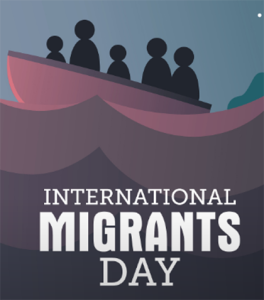International Migrants Day sees borders reopen
International students and skilled migrants will be welcomed back into Australia from tomorrow – after a two week pause over fears of the Omicron variant.
The international border will reopen to fully vaccinated students and eligible visa holders.
 International enrolments have dropped by 70 per cent in Australia – as students choose to study in countries with open borders.
International enrolments have dropped by 70 per cent in Australia – as students choose to study in countries with open borders.
But, after the pause on arrivals lifts, research suggests enrolments will eventually return to pre-pandemic levels.
The move comes just days before the world marks the 31st International Migrants Day, on December 18 – almost exactly 70 years to the day that a conference in Brussels saw the establishment of an agency that would become International Organisation for Migration.
Fittingly, with Australia’s borders open, the theme for this year’s celebration of migration is ‘Harnessing the potential of human mobility’.
Research shows migrants contribute with their knowledge, networks, and skills to build stronger, more resilient communities.
“And the global social and economic landscape can be shaped through impactful decisions to address the challenges and opportunities presented by global mobility and people on the move.” according to the World Bank.
A broad range of factors continue to determine the movement of people. They are either voluntary or forced movements as a result of the increased magnitude and frequency of disasters, economic challenges and extreme poverty or conflict, the bank says.
All these will significantly affect the characteristics and scale of migration in the future, and determine the strategies and policies countries must develop in order to harness the potential of migration while ensuring the fundamental human rights of migrants are protected.
About 281 million people were international migrants in 2020, representing 3.6 per cent of the global population.
The Global Compact for Safe, Orderly and Regular Migration (GCM) offers the opportunity and guidance to actualise human mobility and seize the opportunities it presents.
Better governance of migration and its effects is the aim of target 10.7 of the Sustainable Development Goals (SDGs). Migrants are seen in the 2030 Agenda as development agents.
Human security, in the broadest sense, is the guiding thread of the UN Global Compact for migration. The compact places law and rights at the centre of efforts for the “legal, safe and orderly” migration mentioned in the SDGs.












